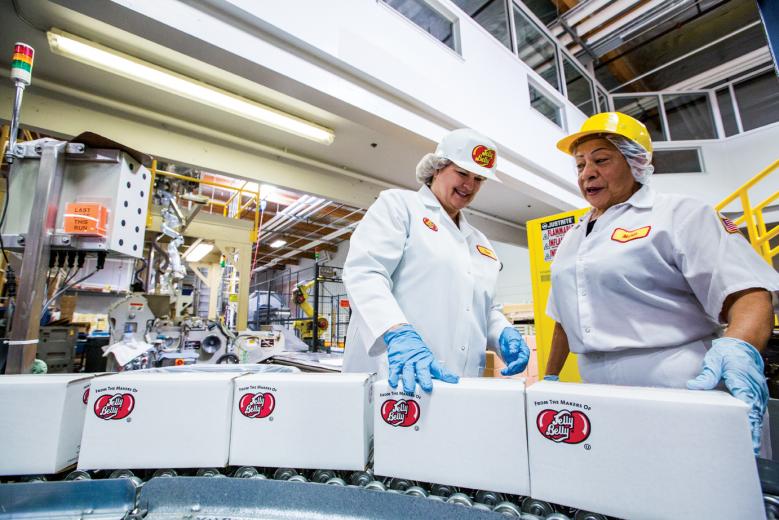About four decades ago, Bob Clark and his brother Don began to work as weekend janitors for Clark Pacific. As young teens, they would tag along with Dad to work and earn a buck. Today, they are co-presidents of that same company, responsible for more than 500 employees and $75 million in annual revenue.
“Even though it’s a family business, we tend to look at it as a business family,” Bob Clark says. “We have many 25-year-plus employees here. When things are tough, you hunker down as a family, and you get through tough times. You’re loyal together and get through together, and we’ve been successful because of how much we respect our employees.”
From Wal-Mart to Raley’s, an estimated 80 to 90 percent of businesses in the U.S. are family-owned, and these establishments have a unique human resources challenge. The biggest problem facing these establishments is the recruitment of skilled staff, according to the 2012 PwC Family Business Survey. To keep the business in the family, younger generations must be brought up the ranks, but to prevent high turnover, opportunities for advancement must also be offered to nonfamily members.
To avoid the nepotism conundrum, experts say family members should earn their way into the business and up the promotions ladder, receiving the same treatment as nonfamily employees along the way. The end result is a next generation of successors who are prepared, and lower turnover among key nonfamily employees.
Entry into the Business
Most medium- to large-sized businesses don’t have development plans, and it creates a challenge when they are recruiting, developing and retaining talent, says Mark Ingram, a partner with Continuity Partners on Capitol Mall. If a candidate is interviewing with a company, he or she wants to see options for a career path and opportunities to develop within an organization. Nonfamily members want to see the same access as family members, he adds.
“Talented people want to know what their opportunities are,” Ingram says. “It doesn’t matter if they’re family members or not.”
Experts recommend treating family employees the same as nonfamily
from the start. Ask them to fill out job applications and undergo
pre-
employment screening, just like everyone else. However, there is
a tricky part for family members. Experts say to plant the seed
for succession, the next generation needs to be exposed to the
family business before college or even high school.
Like Don and Bob Clark, Lisa Brasher began working with her father on holidays and weekends. Now the executive vice chairman with Jelly Belly Candy Co., she is in the fifth generation to work for the company. She has never filled out an application and never worked anywhere else.
“It brings back memories of going into the factory with my dad on the weekends or holidays, and just being mesmerized by candy all over the place and the smell of chocolate,” Brasher says. “I even remember a sugar mist in the air, and I could taste it.”
Not all entrepreneurs can lure their children to the business with candy. When you’re introducing the family business, find an aspect the kids are interested in, says Peter Johnson, director of the Institute for Family Business at the University of the Pacific.
“Some families start a foundation, and kids help decide where to donate money or volunteer their time, so kids can see the value of the business in the community,” he says. “Whether they decide to get involved or not, they’ll at least develop an appreciation for the business.”
Sometimes, the business isn’t big enough to support every family member, and, frankly, not every family member is the right fit. Whatever you do, experts say, don’t create a position solely to give someone a job. One solution, however, is to grow the business. In the case of Jelly Belly, some family members have worked at the Thailand plant while the sixth generation works in the retail stores. These are opportunities that weren’t available to generations past.
“We’re not the kind of company that makes a job for a family
member or takes away another person’s job,” Brasher says. “We
don’t make positions for our kids, and we don’t kick someone else
out so our kid can be here. It has to work for the business and
has to be an area that we think will work for our kids as
well.”
Promotions Within the Business
Although the kids might have swept floors or run errands for the business in high school, consultants agree that offspring are best served if they work outside of the company for a few years and earn a promotion during that time. It’ll build credibility with employees, and the children will learn their market values with their current skill sets, says Hal Johnson, chairman and CEO of LeadershipOne Inc.
“When they come back after five or six years of experience, they aren’t that snot-nosed little kid that employees remember,” Johnson says. “The kid knows how much she made at the other company and how much she should negotiate her salary in the family business. … It’s more of a natural progression.”
While the children are working elsewhere, the family business is likely to have some successes with other key employees. There have been reviews, raises and promotions. Experts say to treat family members just like nonfamily when it comes to rising through the ranks. Give them regular employee reviews and, if possible, have nonfamily employees review family members. There is one major difference in movement among family and nonfamily members. Potential successors tend to move laterally to gain experience in various departments, according to Johnson.
“Ultimately if the family is committed to getting the best business results they can, they probably want to go with the top performer whether they are family or not,” Johnson says. “However, they may put family members in for awhile to gain the experience they will need later in their careers. … If you’re fair and grooming a family member for the business, then other employees will respect that.”
At Clark Pacific, the Clark brothers were hired in the engineering department after graduating college and moved to various departments before being appointed co-presidents in the mid-90s. At Jelly Belly, Brasher earned her stripes by working in virtually all aspects of the business from packaging on the factory floor to billing and ordering in the office.
How Employees View Nepotism
Understanding how all the pieces of a business work is crucial to
building a good manager and credibility among employees. However,
trust must be earned on several levels. If workers don’t think
they are valued, appreciated or have the same opportunities as
family members, they are less likely to be loyal and more likely
to split.
“The risk you run by giving family members inside tracks or special consideration is that you stand to lose very talented leaders or potential leaders who really see an inequity in that,” Ingram says.
Ken Endelmann, founder of Balanced Body in Sacramento, agrees. He has 114 employees, including one son who’s active in the business. As a program specialist, he works with Endelmann on key customers and marketing events.
“If the kids can’t earn the respect of the people they are working with, they shouldn’t be working in the company,” Endelmann says.
Disasters happen when successors aren’t ready or trained properly. That’s when the children feel a sense of entitlement.
Hal Johnson says he’s heard the righteous claim that, “My grandfather’s name is over the door and my dad’s, and that’s my job. I’m going to be president.’ And that person may not be the best choice,” says Johnson from LeadershipOne.
This underscores why businesses should require the same qualifications — and give the same pay — for family and nonfamily members. When Marlene Soiland was a young girl, her father told her she would have to work harder and earn less than the other employees. When she became chief financial officer of her families’ companies, she hired a personnel firm to benchmark the salary of every position regardless of family status. Now, she’s the president and owner of Soiland Management Co. Inc.
“It’s always been a culture of, ‘The position pays this amount.’ Not, ‘You get additional benefits because you’re family,’” she says.
One way to be transparent with key employees is to involve all stakeholders in the development plan, Ingram says. The plan isn’t necessarily focused on climbing the company ladder, but more about finding someone’s niche or passion. As a family member demonstrates attributes and capabilities, they earn the opportunity to take on more responsibilities, including leadership. However, it’s not uncommon for family members to shine in nonexecutive positions. As a successor is moving through the various departments, engage senior operational and administrative management, executive members and subject matter experts so they are part of the building process, he says.
“When you are part of building something, you are more inclined to support it and want to see it succeed,” Ingram says. Employees will also be relieved to hear there is actually a plan, he adds.
Often, the parent plays an active role as the sponsor of the development plan. Here, the parent holds the son or daughter accountable for reporting to work on time and completing work-related projects, readings or training programs. Parents should also check in with stakeholders to discuss performance levels, learning experiences and desired outcomes.
“Parents can enrich the overall experience by infusing a historical chronology of significant events, family values, traditions and legacy,” Ingram says.
Recommended For You

It Runs in the Family
How nepotism turns good business into bad blood
Left unchecked, underachievers can drag down an entire team’s performance, and that goes double when the problem staffer is family.

Dad, You’re Fired.
5 tips for firing family
You can dismiss someone from the conference room, but you may still have to face him or her in the living room.





